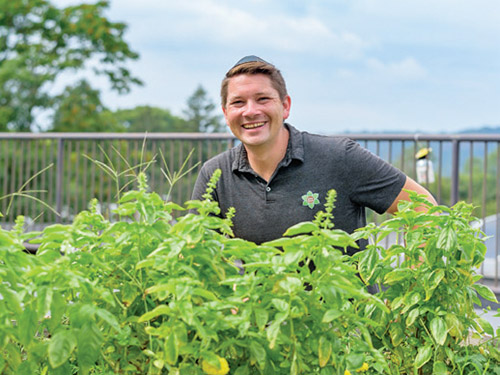


When Yosef Gillers was a college student at Washington University in St. Louis, his Hillel rabbi introduced him to Canfei Nesharim, a new organization focused on environmental education with Torah values. In 2016, Gillers began his own organization, GrowTorah, to provide hands-on gardening programs to Orthodox day schools. After working together for the past two years, the organizations have merged under the GrowTorah, Inc. umbrella.
“Ora Sheinson and Evonne Marzouk, the co-founders of Canfei Nesharim, are two of my personal heroes,” Gillers said, “and I am excited to have them on our board, guiding this new venture.”
GrowTorah, based in Teaneck, has five primary program areas: experiential garden programs at schools; Camp GrowTorah; development and publication of Torah-based environmental articles; science-based, action-oriented environmental resources for adults; and environmentally sustainable action plans for their partner institutions. The Torah values that are part of each program are incubating emunah, environmental stewardship, compassion for all creatures and tzedakah.
GrowTorah develops and manages garden programs at 13 Jewish day schools in New Jersey, New York and Pennsylvania, and has a goal of starting one in every Jewish day school in North America within the next 10 years. At the JCC in Tenafly, the intergenerational garden brings together seniors, preschoolers and students with special needs who participate as helpers. During the summer, students at Camp GrowTorah get to run around in the fresh country air of an organic farm in New City, New York, while learning Torah through planting and harvesting. GrowTorah builds tzedakah into the program by donating most of the produce to a local food bank.
Gillers and Sara Just-Michael, program manager, said that Canfei Nesharim brings to the merger a wealth of resources including curriculum and published articles, which will help in creating programs for students and adults. “We want to engage the community, school and family with bigger-picture environmental issues,” said Gillers, “whether it’s waste reduction, recycling, composting or big or small things you can do at home.”
The guiding Torah concept behind GrowTorah can be found in the midrash in Kohelet: “Look at My works, how beautiful and praiseworthy they are! And all that I have created, it was for you that I created it. Pay attention that you do not corrupt and destroy My world: if you corrupt it, there is no one to repair it after you.”
GrowTorah wants to help people make changes in their lives that will help keep this mandate. “Modern human experience is to be extractive but the Torah imperative is to be regenerative and to be in concert with the earth’s system,” Gillers explained. “We should be analyzing our personal, communal and global actions to be living in concert with these systems instead of fighting against them.”
Gillers and his team focus on positive inspiration, and incremental steps, to help people make personal changes necessary for the environment. “I can drink from a reusable mug. I can reduce my fossil-fuel consumption by finding alternative modes of transport and by carpooling. We have to think about the bigger picture, even if we start small,” he said.
Here’s another wise choice we can make: Leaves that fall on our lawns can be a resource, not a nuisance. Leaf mulching is a process of letting fallen leaves remain, mowing them to break them down and leaving them there. The nutrients in the leaves break down into the soil. It’s the best regenerative option for lawn-care, Gillers said. GrowTorah covers all the raised garden beds in their schools with leaves that protect them all winter and then nourish them in spring.
GrowTorah Inc. will be spending the winter months in planning mode, with new projects to start in the spring. Gillers invites schools to join as partners with GrowTorah educational gardening programs. Synagogues and community centers can inquire about hosting GrowTorah classes and workshops.
And the rest of us should start thinking more about how we can do our part. Environmental awareness is not just a set of new-age buzzwords—it’s a Torah imperative.









